
November 21
1694 Birth: Francois-Marie Arouet—later known as Voltaire:
Voltaire studied law but abandoned it to become a writer. He won success with his plays-mostly classical tragedies at first. He also wrote histories and epic poetry. His writing brought him some measure of success, and his wise investments made him wealthy in his mid-30s. However, his epic poem La Henriade, a satirical attack on politics and religion, infuriated the government and landed Voltaire in the Bastille for nearly a year in 1717.
Voltaire's time in prison failed to quench his satire. In 1726, he again displeased authorities and fled to England. He returned several years later and continued to write plays. In 1734, his Lettres Philosophiques criticized established religions and political institutions, and he was forced to flee once more. He retreated to the region of Champagne, where he lived with his mistress and patroness, Madame du Chételet. In 1750, he moved to Berlin on the invitation of Frederick II of Prussia and later settled in Switzerland, where he wrote his best-known work, Candide. He died in Paris in 1778, having returned to supervise the production of one of his plays.
[Note: Voltaire had the temerity to accuse Frederick the Great of homosexuality, which Frederick neither denied, nor admitted. This caused estrangement between them for some years.—Ed.]
1783 Men fly over Paris:
French physician Jean-François Pilatre de Rozier and François Laurent, the marquis d' Arlandes, make the first untethered hot-air balloon flight, flying 5.5 miles over Paris in about 25 minutes. Their cloth balloon was crafted by French papermaking brothers Jacques-Etienne and Joseph-Michel Montgolfier, inventors of the world's first successful hot-air balloons. [For further information, click here]
1877 Edison's first great invention:
The American inventor announces his invention of the phonograph, a way to record and play back sound.
Edison stumbled on one of his great inventions--the phonograph--while working on a way to record telephone communication at his laboratory in Menlo Park, New Jersey. His work led him to experiment with a stylus on a tinfoil cylinder, which, to his surprise, played back the short song he had recorded, "MARY HAD A LITTLE LAMB". Public demonstrations of the phonograph made the Yankee inventor world famous, and he was dubbed the "Wizard of Menlo Park." [For further information, click here]
1886 Birth: Harold Nicolson:
The third son of Arthur Nicolson, first Baron Carnock, and his wife, Mary Katharine Rowan was born in Teheran. . . . His father was a diplomat and [Harold's] childhood was spent in Turkey, Spain, Morocco and Russia. In 1895, he was sent away to attend The Grange, a preparatory school near Folkestone. In 1900 he went to Wellington College. . . . Nicolson moved on to Balliol College in 1904. According to his biographer, Thomas G. Otte: "After the conventional dullness of Wellington, Nicolson flourished in Balliol's liberal and cerebrally stimulating climate, but left Oxford in 1907 with only a pass degree, having obtained a third in classical honour moderations the previous year."
In October 1909, he passed second in the competitive entrance examination for the diplomatic service. He spent his early years in the service as an attaché at Madrid. In June 1910 Harold met Vita Sackville-West for the first time. Harold visited Vita in Monte Carlo in January 1911: Vita recorded: "He was as gay [not homosexualEd.] and clever as ever, and I loved his brain and his youth, and was flattered at his liking for me. He came to Knole a good deal that autumn and winter, and people began to tell me he was in love with me, which I didn't believe was true, but wished that I could believe it. I wasn't in love with him then—there was Rosamund [Grosvenor]—but I did like him better than anyone, as a companion and playfellow, and for his brain and his delicious disposition."
Vita Sackville-West was a lesbian and at this time was having affairs with Violet Keppel and Rosamund Grosvenor. In January 1912 Nicolson proposed to Vita. She refused him but under pressure from her mother, Victoria Sackville-West, Vita agreed to become engaged. As a result of the engagement, her mother gave her an allowance of £2,500 a year, of which the capital was to become hers on her mother's death. Later that month he was appointed as third secretary at Constantinople. . . .
Despite having several affairs with women, Vita Sackville-West married Harold Nicholson on 1st October, 1913 at Knole House, the family home. They spent their honeymoon in Spain and Italy. Their first son, Lionel Benedict Nicolson, was born on 6th August 1914. They lived both in London and at Long Barn, a house near Sevenoaks. A second son was stillborn in 1915, and their last child, Nigel Nicolson, was born in London in 1917.
During the First World War Nicolson worked for the Foreign Office. Along with Mark Sykes and Leo Amery, he was one of the chief draftsmen of the Balfour Declaration, which committed Britain to supporting a Jewish homeland in Palestine. As a junior Foreign Office official Nicolson attended the Versailles Peace Conference after the Armistice. After the conference he was appointed private secretary to Eric Drummond, the first secretary-general of the infant League of Nations. . . .
Nicolson became the private secretary of Lord Curzon, the Foreign Secretary, at several important conferences and was Britain's representative on a number of subcommittees. In 1925 he was transferred to Teheran as counsellor of legation. Although busy with diplomatic work he still found time to write several literary biographies. . . . In September 1929 Nicolson resigned from the diplomatic service in order to concentrate on his writing career.. . . .
In 1931 Nicolson joined Sir Oswald Mosley and his recently formed New Party. He edited the party newspaper, Action, and stood unsuccessfully for Parliament in the 1931 General Election. Nicolson ceased to support Mosley when he formed the British Union of Fascists in 1932.
Nicolson entered the House of Commons as National Labour MP for West Leicester in the 1935 General Election. Nicolson served as Parliamentary Secretary to the Ministry of Information in the coalition government formed by Winston Churchill in 1940. Nicolson was defeated in the 1945 General Election. . . .
Harold Nicolson died on 1st May 1968, following a stroke, and was buried at Sissinghurst Church. [For further information, click here]
1898 Birth: René Magritte—Belgian surrealist painter:
In the annals of true Surrealism, the name René Magritte is never writ quite as large as Dalí, Ernst, Miré, Man Ray and the literary leaders of the movement.
This may be because the Brussels school of Surrealism was not always in accord with the group in Paris and went too much its own way, and during the Second World War Magritte was inclined to present himself as a painter without affiliation; yet, until his dying day in 1967, he was for 40 years devoutly a Surrealist, his work then as true to pictorial illogic as in 1927 when he first went to Paris.
Born in 1898, the son of a small-scale manufacturer of soup stock cubes and a mad milliner, both in business just to the west of Brussels, he was 12 when he first showed signs of a serious urge to paint. At 18 he was proficient enough to enrol at the Royal Academy in Brussels where he painted realistic landscapes, vaguely Dutch, revealing nothing of the early adolescent trauma that, long fermenting in the darker caverns of the mind, was to provide him with his first Surrealistic images. . . .
During the Nazi occupation in Belgium in 1940-44 he adopted a painterly and colourful approach entirely alien to his habitually neat, dry and featureless facture, and with it came imitations of Titian, Hobbema, de Chirico (a particular influence), Picasso, Braque, Ernst, Klee, Gris and Renoir—so much Renoir that it is known as his Renoir Period. Sold to German officers these paid his bills, but after the war he was pleased enough to paint "Impressionists" quite openly. These last we know (the Renoirs are even worse than the genuine scrapings from the floor of Renoir's studio), but the earlier examples (circa 70 oils and 50 gouaches) have largely blended into authenticity (though there have been disputes in the courts of Paris and Brussels). Is a fake Picasso by Magritte worth more as a Magritte or a Picasso? In this exhibition there is plenty of evidence from the 1940s that he could vary his handling to more or less fit the forgery - but it is wretched, rough and uncomprehending in its mimicry and is better proof that his facture needed to be smooth and dull if his paintings were to accurately illustrate his Surrealist imagery. [For further information, click here]
1914 World War I: Various: Hindenburg is appointed Commander-in-Chief of the Austrian-German Eastern Front: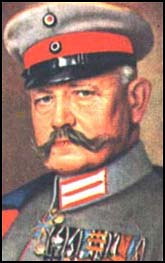
Hindenburg retired from the army 1911. The outbreak of the First World War led to his inevitable recall on 22 August 1914, being sent to the Eastern Front as Commander of East Prussia. The Germans scored a notable victory at Tannenberg in August 1914, where Hindenburg overcame a much larger army, leading to his appointment as Commander-in-Chief of the German armies in the East in September 1914 . . . . He immediately appointed Ludendorff his Quartermaster General.

War at Sea: Admiral Graf von Spee's China Squadron, two heavy and three light cruisers, sink two British heavy cruisers without losing a single ship in the Battle of Coronel, off the coast of Chile. Some time later the British battle cruisers Invincible and Inflexible, under Vice Adm. Sir Frederick Sturdee, will seek out Spee, who had taken his squadron around Cape Horn into the South Atlantic. Spee had planned to raid the British wireless and coaling station at Port Stanley in the Falkland Islands, but discovered Sturdee's squadron there, refueling. The surprised Germans will flee and are pursued and destroyed; approximately 1,800 Germans--including Admiral Spee--will perish on the sunken ships.
1916 Various: Emperor Franz Josef of Austria dies: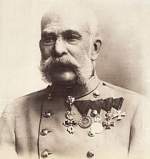
On this day in 1916, with World War I in full swing, the popular monarch Franz Josef of Austria dies at the age of 86, after reigning for 66 years.
The issue of who would succeed the emperor had long been complicated. Franz Josef's life was marked by tragedy: His only son, Rudolf, committed suicide in 1889, and his wife, Elisabeth, was assassinated in Geneva in 1898 by an Italian anarchist. Both of his brothers died early as well; the first, Karl Ludwig, contracted an illness after drinking contaminated water, while the other, Maximilian, was executed in 1867 by a Mexican firing squad after an ill-fated three-year reign as the country's emperor. After all this, Karl Ludwig's son, Archduke Franz Ferdinand, emerged as his uncle's heir.
Franz Josef had no particular affection for Franz Ferdinand. Like many, he considered the archduke silly and ineffectual, and he disapproved of his marriage to Sophie Chotek von Chotkova, a former lady-in-waiting. Nonetheless, when Franz Ferdinand was assassinated in June 1914 by a Bosnian Serb nationalist, the emperor followed the advice of his foreign minister, Leopold Berchtold, and went ahead with a hard-line approach to Serbia that soon led to the outbreak of a general European war.
Popular until his death, Franz Josef was destined to be the last significant Hapsburg monarch. He was succeeded by his 29-year-old great-nephew, Karl I, who immediately began efforts to reform the creaky old Dual Monarchy. First, he dismissed the head of the Austrian army, Conrad von Hotzendorff, replacing him with the more flexible Arz von Straussenberg. He also refused to swear loyalty to the Austrian constitution, announcing his intention to continue with his liberal reforms. Karl's liberalism posed a threat to the Hungarian prime minister, Istvan Tisza, whom he pressured to resign in May 1917.
Some of Karl's greatest efforts were directed toward ending the First World War. In April 1917, he and his foreign minister, Ottokar Czernin, visited Kaiser Wilhelm II of Germany to press the need for peace. The empire, they said, could not hold out much longer. At the same time, unbeknownst to Czernin, Karl was already in secret peace negotiations with Britain and France. His wife, Zita, was French; her brother, Prince Sixte Bourbon-Parma, acted as an intermediary in the negotiations. The negotiations foundered when Karl stubbornly refused to cede any territory to the Italians; the following year, France made the negotiations public to great effect during Germany's spring offensive in 1918. Furious with Karl's deception, Czernin resigned, and the Germans never again trusted the emperor.
The unraveling alliance between the Central Powers had been pushed to the limit, but did not break...yet. Over the course of 1918 it became clear the tide was turning in favor of the Allies. As hunger and discontent intensified within Austria, Karl continued to press for peace, without success. In October, hoping to satisfy growing nationalist aspirations within the Dual Monarchy, he issued a manifesto establishing a federation of Austrian states. It was too little, too late. With the armistice on November 11, 1918, Karl renounced his constitutional powers. The following March, after attempting to retain his throne, he was forced into exile in Switzerland and was formally deposed by an Austrian court. He attempted several times to return to Hungary, but was denied entrance. The last of the Hapsburg monarchs died penniless in April 1922, on the Portuguese island of Madeira. (History.com)
Britannic sinks in Aegean Sea: The Britannic, sister ship to the Titanic, sinks in the Aegean Sea on this day in 1916, killing 30 people. More than 1,000 others were rescued. [For further details, Click here.]
1918 World War I: Various: The US First Army
Mesopotamia: Cobbe's British cavalry reaches Mosul. Despite provisions of the October 30 armistice, Cobbe is ordered to take the city. After some initial squabbling, the Turkish garrison of Halil Pasha marches out and the British remain.
The German fleet surrenders to the Allies at Scapa Flow, in the Orkney Islands, to the north of Scotland:
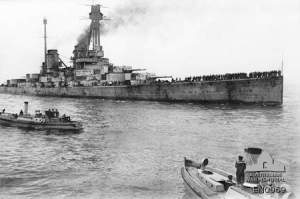
The first ships to be surrendered were the U-boats, which began to arrive at Harwich on 20 November, with 176 eventually being handed over. Hipper refused to lead his fleet to the surrender, delegating the task to Rear-Admiral Ludwig von Reuter. The German fleet was met by the light cruiser Cardiff on the morning of 21 November, and led to the rendezvous with over 370 ships of the Grand Fleet and other allied navies. There were 70 German ships in total; the battleship Koenig and the light cruiser Dresden had engine trouble and had to be left behind. The destroyer V30 struck a mine whilst crossing, and sank.
The German ships were escorted into the Firth of Forth, where they anchored. Beatty signalled them: "The German flag will be hauled down at sunset today and will not be hoisted again without permission." The fleet was then moved between 25 and 27 November to Scapa Flow; the destroyers to Gutter Sound and the battleships and cruisers to the north and west of the island of Cava
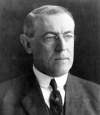
1919 President Wilson is again in control of his faculties, although he never fully recovers. There is no provision in the law for declaring a president unable "to discharge the powers and duties of the said office."
1920 Bloody Sunday in Ireland: Sunday, Nov. 21 in 1920 was "Bloody Sunday" in Ireland, a date begun with the IRA execution of British agents in Dublin, and concluded with three IRA men killed in British custody. [For further details, Click here.]
1924 Volkishness: Karl Maria Wiligut (Weisthor) is involuntarily committed to a Salzburg mental asylum and will not be released until early 1927. (THP)
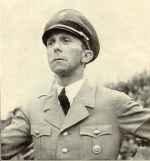
1926 Weimar: The Supreme SA leadership is constituted as Goebbels embarks on his 'conquest of Red Berlin.' (Maser)
1927 An essay by Goebbels is published in Der Angriff:
Things are becoming clear all over. The smoke of rhetoric is vanishing, and all that remains is a miserable remnant of fantasies that absolutely no one confuses with reality. The German proletariat is one hope poorer, perhaps its last one. Marx's game is over. Nature is in charge once again, and it has made the eternal laws pitilessly and unmistakably clear: the laws of personality, struggle and race.
1932 Goebbels Diary: "In a conversation with Dr. Schacht, I assured myself that he absolutely shares our point of view. He is one of the few who stand immovable behind the Fuehrer."
1933 Various: Zionism:
The United States officially recognizes the Soviet Union.
1935 Holocaust: The German citizenship of Jews is officially revoked. The Nazi government announces that the Nuremberg Laws apply to all Jews, German or foreign, without exception. (THP)
1937 Protocols: The Swiss Court of Criminal Appeal quashes the judgment of the lower court's verdict on the authenticity of The Protocols of the Elders of Zion in its entirety.
In 1935 a Swiss judge, presiding at a trial of two Swiss National Socialists charged with circulating the Protocols, wrote: I hope that one day there will come a time when no one will any longer comprehend how in the year 1935 almost a dozen fully sensible and reasonable men could for fourteen days torment their brains before a court of Berne over the authenticity or lack of authenticity of these so-called Protocols . . .that, for all the harm they have already caused and may yet cause, are nothing but ridiculous nonsense.
Unfortunately, the judge's hope has not yet been fully realized. There are still those anti-Semites and their willing audiences who remain ready to circulate and believe this fantasy of hate.
1940 World War II: From notes of a conference at which State Secretary Dr. Landfried represented the Reich Ministry of Economics:
Reich Commissioner: Today's conference is the continuation of a conference which was held in Berlin. On this occasion I should like, first of all, to stress and establish definitely that the collaboration between the Wehrmacht and the Reich Commissioner is exemplary. I must protest against the idea that the Wehrmacht carried out its financial task here in a muddled and irresponsible manner. We must also take into account the particular circumstances which then prevailed in Norway and which still partially prevail. Certain tasks were fixed by the Fuehrer which were to be carried out within a given time. At the conference in Berlin the following points were settled, which we can take as a basis of today's conference. There is no doubt that the country of Norway was utilized for the execution of the tasks of the Wehrmacht during the last 7 months in such a way that a further drain on the country without some compensation is no longer possible in view of the future tasks of the Wehrmacht. I considered it from the beginning my obvious duty in my capacity as Reich Commissioner to devote my activities to mobilizing all the economic and material forces of the country for the purposes of the Wehrmacht and not to call on the resources of the Reich as long as I am in a position to organize such resources in the country.
Dr. Landfried: I am very glad to be able to state that we have succeeded here in Norway... in mobilizing the economic forces of Norway for German needs to an extent which it has not been possible to attain in all the other occupied countries. I must thank you especially in the name of the Minister of Economics for having succeeded in inducing the Norwegians to achieve the greatest possible results.
1941 World War II: Various: Navy Directive No. 5: "Directive to: Yamamoto, C in C, Combined Fleet 1. The Commander-in-Chief of the Combined Fleet will immediately assemble and call back the operational units if the Japanese-American negotiation is successful." (Dillon)
Alcan Highway: The US Army Corps of Engineers, working with the Public Roads Administration, completes the Alcan Highway, an overland military supply route to the US territory of Alaska, and a link between airfields in Canada and Alaska. The project is an emergency war measure to provide greater protection for Alaska and northwestern Canada against attack by Japanese forces. Completed in less than ten months, the Alcan Highway, named after an acronym for Alaska and Canada, stretches more than 1,500 miles from Sawson Creek, British Colombia, to Fairbanks, Alaska. In the following year, the road will be improved upon by private contractors, and in 1948, three years after the end of World War II, the entire route is opened to civilian traffic. Today, the Alcan Highway is known as the Alaska Highway.
Vichy France: Punishment and isolation camp is opened at Hadjerat-M'Guil in Algeria. It contains 170 prisoners nine of whom are tortured and murdered in conditions of the worst brutality. Two of the murdered are Jews, one of whom had earlier been released from a concentration camp in Germany in 1939 and fled to France. (THP) Nazi chief architect requests POWs to labor for a new Berlin: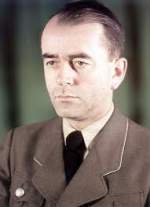
On this day in 1941, Albert Speer, Adolf Hitler's chief architect and minister for armaments and war production, asks for 30,000 Soviet prisoners of war to use as slave laborers to begin a massive Berlin building program.
Speer was born March 19, 1905, in Mannheim, Germany. At the age of 22, he received his architectural license, having studied at three German technical schools. He became an ardent Nazi after hearing Hitler orate at a rally in late 1930, and joined the party in January 1931. Hitler, always impressed by academic credentials and any kind of artistic or technical talent, made Speer his personal architect. Among the projects with which the Fuhrer entrusted Speer was the design of the parade grounds for the Nuremberg Party Congress in 1934, which Leni Riefienstahl made famous in her famous propaganda film Triumph of the Will.
As minister of armaments and munitions, Speer's job description expanded to include not only armament production and transportation, but also the direction of raw material use and finally the conscription of slave labor, culled from concentration camps, for war material production. These slave laborers would come in handy for Hitler's "new" Berlin. Speer wanted to begin construction even as the war waged. Despite the drain on resources Hitler agreed. Speer beguiled the Fuhrer with models of a Great Hall for the Chancellery and a grand office for Goering.
But as the war turned against Nazi Germany, the rebuilding plans were scrapped. When the war was over, Hitler was dead, and Speer was tried as a war criminal at Nuremberg, the site of his grand parade, and sentenced to 20 years in Spandau prison in Berlin. (History.com)
Holocaust: Nov 1-15 The Jews of Bukovina, like those of Bessarabia, are uprooted from their homes in more than 100 communities, then marched away and interned. Within a year, more than 120,000 of them had died. (THP)
1942 World War II: Various: Stalingrad:
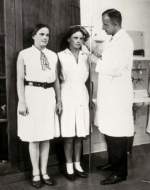
1942 Holocaust: Professor Fischer retires. His successor as Director of the KWI of Anthropology, Human Heredity, and Eugenics is Professor von Verschuer (above). (THP)
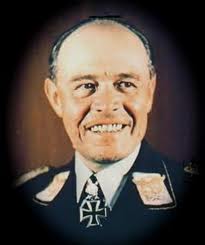
1943 World War II: Field Marshal Kesselring is appointed commander-in-chief of all German forces in Italy.
1944 World War II: The US 8th Air Force launches heavy attacks against Hamburg and the synthetic fuel producing plants of Leuna at Merseburg.
1945 Nuremberg Tribunal: On the second day of the historic trial, the pleas of the indicted are heard, as well as Justice Jackson's Opening Statement:
Twice in my lifetime, the United States has sent its young manhood across the Atlantic, drained its resources, and burdened itself with debt to help defeat Germany. But the real hope and faith that has sustained the American people in these great efforts was that victory for ourselves and our Allies would lay the basis for an ordered international relationship in Europe and would end the centuries of strife on this embattled continent.
1967 Vietnam War: Westmoreland tells media the communists are losing: Gen. William Westmoreland, commander of U.S. Military Assistance Command Vietnam, tells U.S. news reporters: "I am absolutely certain that whereas in 1965 the enemy was winning, today he is certainly losing." [For further information, click here]
1992 Germany sells Romani asylum seekers back to Romania for $21 million, and begins shipping them in handcuffs on November 1. Some Roma commit suicide rather than go. The German press agency asks western journalists not to use the word "deportation" in their coverage of this, because that word has 'uncomfortable historical associations.'
2002 NATO invites seven former communist countries to join the alliance: Slovenia, Slovakia, Estonia, Latvia, Lithuania, Romania and Bulgaria. (AP)Edited by Levi Bookin (Copy editor) Click to join 3rdReichStudies FAIR USE NOTICE: This site may contain copyrighted material the use of which has not always been specifically authorized by the copyright owner. We are making such material available in our efforts to advance understanding of historical, political, human rights, economic, democracy, scientific, environmental, and social justice issues, etc. We believe this constitutes a 'fair use' of any such copyrighted material as provided for in section 107 of the US Copyright Law. In accordance with Title 17 U.S.C. Section 107, the material on this site is distributed without profit to those who have expressed a prior interest in receiving the included information for research and educational purposes. If you wish to use copyrighted material from this site for purposes of your own that go beyond 'fair use', you must obtain permission from the copyright owner. Please note that the list-owner and the moderator are not responsible for, and do not necessarily approve of, the random ads placed on our pages by our web server. They are, unfortunately, the price one pays for a 'free' website.
levi.bookin@gmail.com






